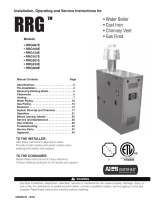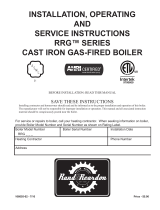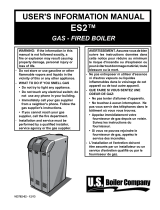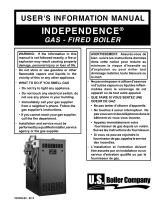
103699-02 - 9/13
WARNING: If the information in this
manual is not followed exactly, a re or
explosion may result causing property
damage, personal injury or loss of life.
- Do not store or use gasoline or other
ammable vapors and liquids in the
vicinity of this or any other appliance.
- WHAT TO DO IF YOU SMELL GAS
• Do not try to light any appliance.
• Do not touch any electrical switch;
do not use any phone in your
building.
• Immediately call your gas supplier
from a neighbor's phone. Follow the
gas supplier's instructions.
• If you cannot reach your gas
supplier, call the re department.
- Installation and service must be
performed by a qualied installer,
service agency or the gas supplier.
AVERTISSEMENT. Assurez-vous de bien
suivre les instructions données dans
cette notice pour réduire au minimum
le risque d'incendie ou d'explosion ou
pour éviter tout dommage matériel, toute
blessure ou la mort.
- Ne pas entreposer ni utiliser d'essence
ni d'autres vapeurs ou liquides inam-
mables dans le voisinage de cet
appareil ou de tout autre appareil.
- QUE FAIRE SI VOUS SENTEZ UNE
ODEUR DE GAZ:
• Ne pas tenter d'allumer d'appareils.
• Ne touchez à aucun interrupteur. Ne
pas vous servir des téléphones dans le
bâtiment où vous vous trouvez.
• Appelez immédiatement votre
fournisseur de gaz depuis un voisin.
Suivez les instructions du fournisseur.
• Si vous ne pouvez rejoindre le
fournisseur de gaz, appelez le
service des incendies.
- L'installation et I'entretien doivent
être assuréx par un installateur ou un
service d'entretien qualié ou par le
fournisseur de gaz.
USER'S INFORMATION MANUAL
SERIES 2
®
GAS - FIRED BOILER

2
The following terms are used throughout this manual to bring attention to the presence of hazards of various risk levels.
WARNING
Indicates a potentially hazardous situation which,
if not avoided, could result in death, serious injury
or substantial property damage.
CAUTION
Indicates a potentially hazardous situation which,
if not avoided, may result in moderate or minor
injury or property damage.
Important Product Safety Information
Refractory Ceramic Fiber Product
Warning:
The Repair Parts list designates parts that contain refractory ceramic fibers
(RCF). RCF has been classified as a possible human carcinogen. When
exposed to temperatures about 1805°F, such as during direct flame contact,
RCF changes into crystalline silica, a known carcinogen. When disturbed as a
result of servicing or repair, these substances become airborne and, if inhaled,
may be hazardous to your health.
AVOID Breathing Fiber Particulates and Dust
Precautionary Measures:
Do not remove or replace RCF parts or attempt any service or repair work
involving RCF without wearing the following protective gear:
1. A National Institute for Occupational Safety and Health (NIOSH)
approved respirator
2. Long sleeved, loose fitting clothing
3. Gloves
4. Eye Protection
• Take steps to assure adequate ventilation.
• Wash all exposed body areas gently with soap and water after contact.
• Wash work clothes separately from other laundry and rinse washing
machine after use to avoid contaminating other clothes.
• Discard used RCF components by sealing in an airtight plastic bag. RCF
and crystalline silica are not classified as hazardous wastes in the United
States and Canada.
First Aid Procedures
:
• If contact with eyes: Flush with water for at least 15 minutes. Seek
immediate medical attention if irritation persists.
• If contact with skin: Wash affected area gently with soap and water.
Seek immediate medical attention if irritation persists.
• If breathing difficulty develops: Leave the area and move to a location
with clean fresh air. Seek immediate medical attention if breathing
difficulties persist.
• Ingestion: Do not induce vomiting. Drink plenty of water. Seek
immediate medical attention.

3
Figure 1: Control Locations
Basic Operation
CAUTION
Should overheating occur or the gas supply fail to shut off, do not turn off or disconnect the electrical
supply to the pump. Instead, shut off the gas supply at a location external to the appliance.
En cas de surchauffe ou si I'admission de gaz ne peut étre coupée, ne pas couper ni débrancher
l'alimentation électrique de la pompe. Fermer plutôt le robinet d'admission de gaz à l'extérieur de
I'appareil.
Do not use this boiler if any part has been under water. Immediately call a qualied service technician
to inspect the boiler and to replace any part of the control system and any gas control which has been
under water.
Avoid operating this boiler in an environment where saw dust, loose insulation bers, dry wall dust,
etc. are present. If boiler is operated under these conditions, the burner interior and ports must be
cleaned and inspected daily to insure proper operation.
A. General This boiler is equipped with controls for
proper operation. All controls must be in proper
working order. Contact a qualied service agency
to provide annual maintenance as specied in the
Installation, Operating and Service Instructions.
WARNING
Service on this boiler should be undertaken only
by trained and skilled personnel from a qualied
service agency.
WARNING
Do not reset Block Vent Switch unless a qualied
service agency has determined and corrected
the cause of any blockage in the vent system or
chimney.
1. Limit See Figure 1. A device which automatically
interrupts boiler operation when the water
temperature exceeds the set point. Maximum
allowable boiler water temperature is 220°F. Switch
differential is 15°F.
Original equipment with this boiler is U.S. Boiler
Intelligent Hydronic Control and Limit Rated
Temperature Sensor combination. The Intelligent
Hydronic Control shuts off boiler main burners
when boiler water temperature exceeds pre-
programmed Intelligent Hydronic Control water
temperature set point. Boiler main burners will
re-light automatically, providing the call for heat is
present, when boiler water temperature falls below
pre-programmed control water temperature set point
less the set point differential.
2. Blocked Vent Switch See Figure 1. A device
which automatically interrupts boiler operation
when excessive vent system blockage occurs. If the
control was activated to interrupt boiler operation,

4
Figure 2: Flame Rollout Switch and Observation
Port Location
do not attempt to place boiler in operation. Contact
a qualied service agency.
3. Flame Rollout Switch See Figure 2. A device
which automatically interrupts boiler operation
when ames or excessive heat are present in the
vestibule. The control is a single use device. If the
control was activated to interrupt boiler operation,
do not attempt to place boiler in operation. Contact
a qualied service agency.
4. Electronic Ignition System - see Figure 1. The
Electronic Ignition (EI) System consists of:
a. a solid state ignition control with integral
ignition module to initiate, monitor and stop
burner operation.
b. a combination gas valve to regulate gas ow to
the main burners.
c. a pilot burner to provide the ignition source for
the main burners.
B. Instructions to place boiler in operation and to turn
off boiler are shown on the Lighting or Operating
Instruction label posted on the inside of the front
removable door. See Figure 3 for front door removal
instructions. The Lighting/Operating Instructions are
also shown in Figures 4 and 5.
Figure 3: Jacket Front Panel Removal
User Maintenance
WARNING
Service on this boiler should be undertaken only by trained and skilled personnel from a qualied service
agency. Inspections should be performed at intervals specied in Installation, Operating and Service
Instructions and this manual. Maintain manuals in a legible condition.
Keep boiler area clear and free of combustible materials, gasoline and other ammable vapors and liquids.
Do not place any obstructions in boiler room that will hinder ow of combustion and ventilation air.
A. General Housekeeping (Continuous).
1. Keep boiler area clear and free of combustible
materials and obstructions to the free ow of
combustion and ventilation air to the boiler.
2. Do not store or use gasoline or other ammable
vapors or liquids in the vicinity of the boiler or any
other appliance.
3. Do not store or use sources of hydrocarbons in the
vicinity of the boiler. Sources of hydrocarbons
include bleaches, cleaners, chemicals, sprays, paint
removers, fabric softeners, cat litter and refrigerants.
B. Inspect Vent System (Monthly). See Figure 6. Follow
instructions TO TURN OFF GAS TO APPLIANCE
(see Figures 4 and 5) and contact a qualied service
agency if any of the following conditions are found:
1. Collapsed vent pipe
2. Disconnected or loose joints
3. Sags in horizontal runs
4. Corrosion or other deterioration
5. Broken or loose supports
6. Blocked vent switch not attached to draft hood.

5
Figure 4: Operating Instructions, VR8204 and VR8304 Gas Valves

6
Figure 5: Sequence of Operation
Thermostat Calls
for Heat
Circulator Output
Energizes
Waiting For
Damper to Open
Ignition Source Energized
Pilot Gas On
Limits Closed Checked
Trial For Ignition
Ignition Source Off
Main Gas On
Pilot Flame
Proven
Pilot Flame
Not Proven
Call For Heat Ends
Standby
Intelligent Hydronic
Control can display
(typical)
Delay 60 Seconds
Ignition Source Off
Pilot Gas Off
Main Gas Off
Vent Damper De-Energized
Circulator Output De-Energized
Continuous
Retry
Standby
Vent Damper Energized
Self Testing

7
Figure 9: 1 Inch Main Burner Flame
Figure 7: Pilot Burner Flame, Honeywell Q3481
Figure 8: 40mm Main Burner Flame
C. Inspect Pilot and Main Burner Flame (Monthly).
1. Adjust thermostat to lowest setting.
2. Remove front removable panel. See Figure 3.
3. Locate Pilot Observation Port. See Figure 2.
4. Check pilot burner ame. See Figure 7.
The pilot produces three (3) ames. The center
ame should be steady, medium hard blue
enveloping 3/8 to ½ inch of sensing probe. If ames
are yellow and lazy, follow instructions TO TURN
OFF GAS TO APPLIANCE (see Figure 4) and
contact a qualied service agency.
Figure 6: Typical Vent System Installation
5. Adjust thermostat to highest setting.
6. Check main burner ames. See Figure 8 or 9.
Flame should have clearly dened inner cones with
no yellow tipping. Orange-yellow streaks caused
by dust should not be confused with true yellow
tipping. If yellow ames are observed, follow
instructions TO TURN OFF GAS TO APPLIANCE
(see Figure 4) and contact a qualied service agency.
7. Adjust thermostat to normal setting.
D. ScheduleInspectionbyQualiedServiceAgency
(Annual or at Beginning of Heating Season). For
continued safe operation a qualied service agency
must provide a more detailed inspection of burners, heat
exchanger and vent system, and provide maintenance
as specied in Installation, Operating and Service
Instructions.

8
All Series 2
®
Repair Parts may be obtained through your local U.S Boiler Company product distributor.
Should you require assistance in locating a U.S Boiler Company product distributor in your area, or have
questions regarding the availability of U.S Boiler Company brand products or repair parts, please contact
U.S. Boiler Company Customer Service at (717) 481-8400 or Fax (717) 481-8408.
-
 1
1
-
 2
2
-
 3
3
-
 4
4
-
 5
5
-
 6
6
-
 7
7
-
 8
8
US Boiler 205NI-T2 User guide
- Type
- User guide
Ask a question and I''ll find the answer in the document
Finding information in a document is now easier with AI
Related papers
Other documents
-
 Rand and Reardon RRG130 User manual
Rand and Reardon RRG130 User manual
-
Burnham 1099-01R1-/10 User manual
-
Crown Boiler Raptor User manual
-
Peerless Boilers 63 series User manual
-
Crown Boiler Cast Iron User manual
-
 Rand and Reardon RRG167EN-R User manual
Rand and Reardon RRG167EN-R User manual
-
 Rand and Reardon RRG130 Installation guide
Rand and Reardon RRG130 Installation guide
-
Peerless PEE0103001 User manual
-
Crown Boiler BWC-150ENST1PSU User guide
-
Crown Boiler Phantom X 399 500 User manual














